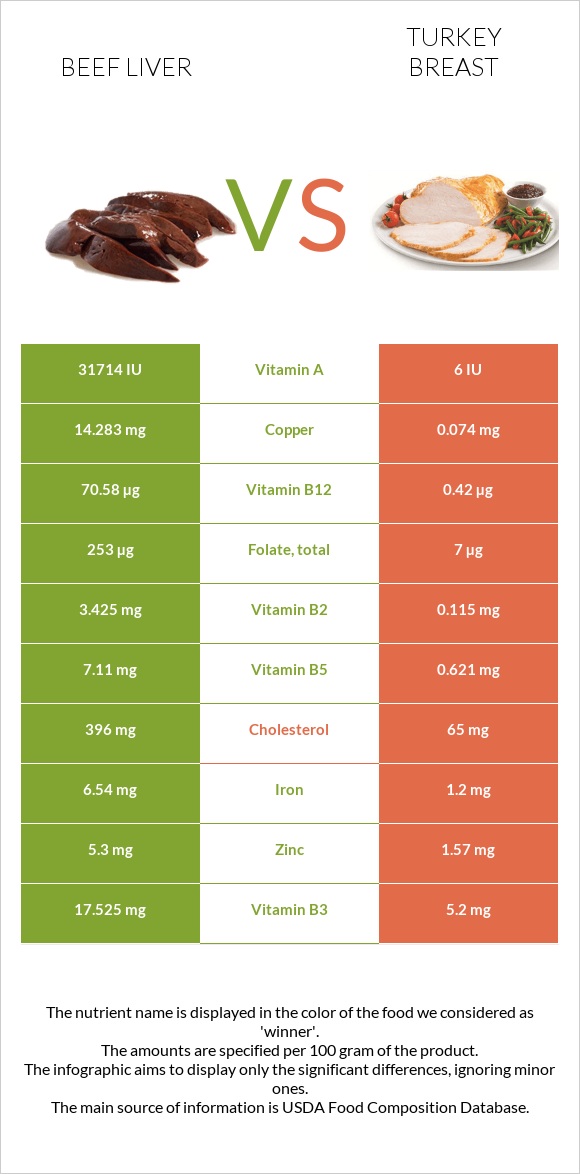Beef Liver vs. Turkey breast — In-Depth Nutrition Comparison
Compare
What are the differences between beef Liver and turkey breast?
- Beef Liver is richer than turkey breast in vitamin B12, copper, vitamin A, vitamin B2, vitamin B5, vitamin B3, iron, folate, and phosphorus.
- Beef Liver's daily need coverage for vitamin B12 is 2923% more.
- Beef Liver has 5286 times more vitamin A than turkey breast. While beef Liver has 31714 IU of vitamin A, turkey breast has only 6 IU.
- The amount of cholesterol in turkey breast is lower.
We used Beef, variety meats, and by-products, liver, cooked, braised and Turkey, all classes, breast, meat, and skin, raw types in this article.
Infographic

Infographic link
Mineral Comparison
Mineral comparison score is based on the number of minerals by which one or the other food is richer. The "coverage" charts below show how much of the daily needs can be covered by 300 grams of the food.
| Contains more PotassiumPotassium | +28% |
| Contains more IronIron | +445% |
| Contains more CopperCopper | +19201.4% |
| Contains more ZincZinc | +237.6% |
| Contains more PhosphorusPhosphorus | +167.2% |
| Contains more ManganeseManganese | +1877.8% |
| Contains more SeleniumSelenium | +61.2% |
| Contains more MagnesiumMagnesium | +14.3% |
| Contains more CalciumCalcium | +116.7% |
| Contains less SodiumSodium | -25.3% |
Vitamin Comparison
Vitamin comparison score is based on the number of vitamins by which one or the other food is richer. The "coverage" charts below show how much of the daily needs can be covered by 300 grams of the food.
| Contains more Vitamin CVitamin C | +∞% |
| Contains more Vitamin AVitamin A | +472000% |
| Contains more Vitamin EVitamin E | +∞% |
| Contains more Vitamin DVitamin D | +∞% |
| Contains more Vitamin B1Vitamin B1 | +234.5% |
| Contains more Vitamin B2Vitamin B2 | +2878.3% |
| Contains more Vitamin B3Vitamin B3 | +237% |
| Contains more Vitamin B5Vitamin B5 | +1044.9% |
| Contains more Vitamin B6Vitamin B6 | +111.9% |
| Contains more Vitamin B12Vitamin B12 | +16704.8% |
| Contains more Vitamin KVitamin K | +∞% |
| Contains more FolateFolate | +3514.3% |
All nutrients comparison - raw data values
| Nutrient |  |
 |
DV% diff. |
| Vitamin B12 | 70.58µg | 0.42µg | 2923% |
| Copper | 14.283mg | 0.074mg | 1579% |
| Vitamin A | 9442µg | 2µg | 1049% |
| Vitamin B2 | 3.425mg | 0.115mg | 255% |
| Vitamin B5 | 7.11mg | 0.621mg | 130% |
| Cholesterol | 396mg | 65mg | 110% |
| Vitamin B3 | 17.525mg | 5.2mg | 77% |
| Choline | 426mg | 77% | |
| Iron | 6.54mg | 1.2mg | 67% |
| Folate | 253µg | 7µg | 62% |
| Phosphorus | 497mg | 186mg | 44% |
| Vitamin B6 | 1.017mg | 0.48mg | 41% |
| Zinc | 5.3mg | 1.57mg | 34% |
| Selenium | 36.1µg | 22.4µg | 25% |
| Manganese | 0.356mg | 0.018mg | 15% |
| Protein | 29.08g | 21.89g | 14% |
| Vitamin B1 | 0.194mg | 0.058mg | 11% |
| Vitamin D | 49 IU | 6% | |
| Vitamin D | 1.2µg | 6% | |
| Saturated fat | 2.947g | 1.91g | 5% |
| Monounsaturated fat | 1.124g | 2.66g | 4% |
| Polyunsaturated fat | 1.109g | 1.66g | 4% |
| Fats | 5.26g | 7.02g | 3% |
| Vitamin E | 0.51mg | 3% | |
| Vitamin K | 3.3µg | 3% | |
| Calories | 191kcal | 157kcal | 2% |
| Vitamin C | 1.9mg | 0mg | 2% |
| Carbs | 5.13g | 0g | 2% |
| Potassium | 352mg | 275mg | 2% |
| Magnesium | 21mg | 24mg | 1% |
| Calcium | 6mg | 13mg | 1% |
| Sodium | 79mg | 59mg | 1% |
| Net carbs | 5.13g | 0g | N/A |
| Trans fat | 0.365g | N/A | |
| Tryptophan | 0.368mg | 0.242mg | 0% |
| Threonine | 1.215mg | 0.957mg | 0% |
| Isoleucine | 1.352mg | 1.099mg | 0% |
| Leucine | 2.67mg | 1.704mg | 0% |
| Lysine | 2.247mg | 1.996mg | 0% |
| Methionine | 0.759mg | 0.616mg | 0% |
| Phenylalanine | 1.515mg | 0.857mg | 0% |
| Valine | 1.761mg | 1.141mg | 0% |
| Histidine | 0.879mg | 0.66mg | 0% |
| Omega-3 - DHA | 0g | 0.01g | N/A |
| Omega-3 - ALA | 0.017g | N/A | |
| Omega-3 - DPA | 0g | 0.01g | N/A |
| Omega-6 - Gamma-linoleic acid | 0.025g | N/A | |
| Omega-6 - Eicosadienoic acid | 0.011g | N/A | |
| Omega-6 - Linoleic acid | 0.659g | N/A |
Macronutrient Comparison
Macronutrient breakdown side-by-side comparison
Protein:
29.08 g
Fats:
5.26 g
Carbs:
5.13 g
Water:
58.81 g
Other:
1.72 g
Protein:
21.89 g
Fats:
7.02 g
Carbs:
0 g
Water:
70.05 g
Other:
1.04 g
| Contains more ProteinProtein | +32.8% |
| Contains more CarbsCarbs | +∞% |
| Contains more OtherOther | +65.4% |
| Contains more FatsFats | +33.5% |
| Contains more WaterWater | +19.1% |
Fat Type Comparison
Fat type breakdown side-by-side comparison
Saturated fat:
Sat. Fat
2.947 g
Monounsaturated fat:
Mono. Fat
1.124 g
Polyunsaturated fat:
Poly. Fat
1.109 g
Saturated fat:
Sat. Fat
1.91 g
Monounsaturated fat:
Mono. Fat
2.66 g
Polyunsaturated fat:
Poly. Fat
1.66 g
| Contains less Sat. FatSaturated fat | -35.2% |
| Contains more Mono. FatMonounsaturated fat | +136.7% |
| Contains more Poly. FatPolyunsaturated fat | +49.7% |





